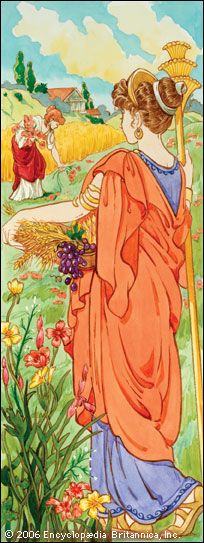 In ancient Greek mythology Demeter was the goddess of grain and farming. She was associated with the Roman goddess Ceres because they shared many characteristics. Demeter’s symbols included stalks of grain and a basket filled with flowers, grain, and fruit.
In ancient Greek mythology Demeter was the goddess of grain and farming. She was associated with the Roman goddess Ceres because they shared many characteristics. Demeter’s symbols included stalks of grain and a basket filled with flowers, grain, and fruit.
Demeter was the daughter of Cronos and Rhea, who were Titans. The Titans were giants who once ruled the world. Demeter was said to watch over all aspects of farming, including plowing, planting, and harvesting. In ancient Greece the women typically did these jobs. So Greek women often worshipped Demeter.
The ancient Greeks used a story about Demeter to explain the changing of the seasons. Demeter’s daughter was the beautiful Persephone (Proserpina). Hades, the god of the underworld, seized Persephone. He took her to the land of the dead to be his queen. Demeter was overcome with grief. In her great sadness she did not care about helping the harvest. As a result, no crops on Earth could grow.
Zeus, the chief god, ordered Hades to give up Persephone. But in the underworld Persephone had eaten the seed of a fruit called a pomegranate. Because of this, she would always be connected to the land of the dead. For part of each year she would have to return to Hades. When Persephone was gone, Demeter refused to let anything grow. Winter then fell over the Earth. But when Persephone returned, Demeter made all the plants bloom in celebration. It was then spring.




